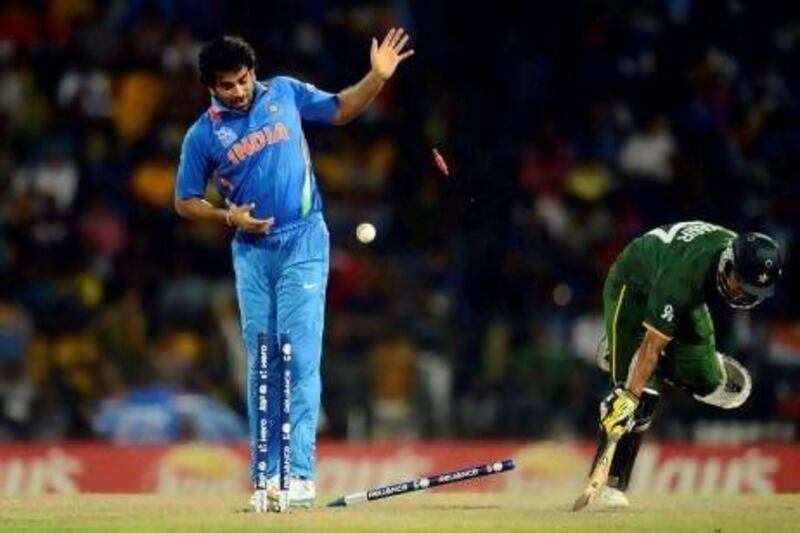COLOMBO // If you could somehow grab hold of the mood of a crowd and transform it into live action on the field, you would get what we got at the R Premadasa Stadium tonight in the first three overs of the game between Pakistan and India.
That much energy, not channelled, unhinges all senses.
It goes without saying the stands were packed. By an unscientific count, there appeared to be more Pakistan supporters than India (how can that really be given their populations?).
And as soon as the players set themselves on the field, the non-control of fans released on to the field.
Zaheer Khan lost his lines, a catch was dropped, wides were bowled, inside edges went for boundaries.
What it was is unclear, but it was not cricket being played as much as simply a great release of the force in the stands through 13 nervy players on the field.
Pretty swiftly though it settled into the new reality of India-Pakistan games, with which most Pakistani fans must be familiar even if they might not acknowledge it so readily.
And that, you see, is that over the past decade, India have become to Pakistan almost precisely what Pakistan were to India during the '80s and '90s. In the great India-Pakistan rivalry, India are the new ('80s and '90s) Pakistan.
The figures will tell you numerically of a slight superiority (25 Indian wins to 20 Pakistan victories across all three formats) but they will not tell you the real extent of it.
When Pakistan dominated India, patterns – strange but distinct – would emerge with no relation to any pattern that preceded, or followed.
No matter how poorly the team had been playing they would shake it off against India.
Out-of-form players would find form for this game. No-name players could win a game. Big name stars would grow even bigger.
Their counterparts, by contrast, would shrink.
They won the big moments (granted every moment in these games is big). Big games (World Cups aside) were won. Decisions went their way. Miraculous catches were held, dramatic run-outs inflicted. It was – and is – the most infuriating kind of hold.
And precisely this has been happening, except for India now, over this decade. It is what happened tonight.
Think about it. Virender Sehwag was recalled and suddenly looked more like Virender Sehwag than he has for a while.
And way more sensible.
Yuvraj Singh, his place questioned by two high-profile former players (if few else), took wickets, effected a direct hit run-out and finished it nicely, appropriately, with the bat.
Lakshmipathy Balaji remembered how good – and popular – he had been in Pakistan on the 2003/04 series and re-enacted it.
And though Virat Kohli has been awesome against any and everyone lately, has he not looked even more so already against Pakistan?
India, despite their own indifferent form and the usual overheated chit chat that surrounds conflicts and tensions in the side all the time now, suddenly honed in, focused and sharper.
Their eyes and minds narrowed to the task at hand, nothing else. Just like Pakistan used to get. Players hate each other? Beat India. Matches are fixed? Beat India. Captains changed? Beat India.
And Pakistan, like that old India, become scrambled, as they were tonight. What else to explain sending in Shahid Afridi at one down?
Sure you could argue for it, with a little reason too, as Mohammad Hafeez did. He wanted to free Afridi's batting mind by sending him higher up, a bid to pick up some kind of form.
But the argument against holds greater weight: in short, Imran Nazir is already almost as risky as Afridi and Afridi is out of form while Nasir Jamshed is in form. Why change a batting order that has won you games? And would Hafeez have sent him in at one down against England or Australia?
Probably not.
Their best players – Umar Gul, Saeed Ajmal, Afridi in this case – go flat.
Catches are dropped (admittedly Pakistan do dish out that particular favour equitably across the world) and there goes the game.
And then, as Gul and Yuvraj walked off the field together, chatting amicably like two normal young men, Gul maybe asking Yuvraj about his health, Yuvraj maybe about Gul's baby, it ended the brief unique pause of India-Pakistan, signalling that the tournament can now continue as per normal for both sides.
Follow us
[ @SprtNationalUAE ]





